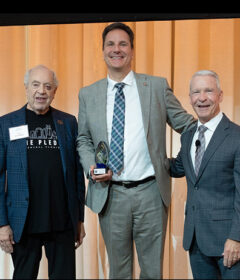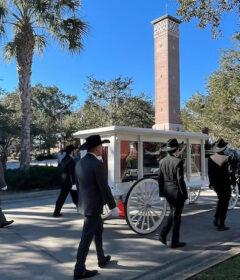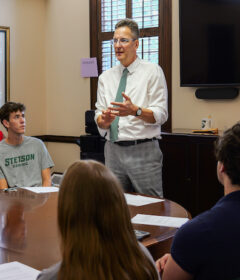Giving Kids A Smile
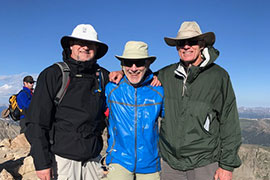
Nestor de Armas has seen children around the world with cleft lips and palates, congenital deformities that cause their families to hide them indoors and never send them to school.

Twenty years ago, de Armas started helping a charity that provided free reconstructive surgery and long-term medical care for children with cleft lips and palates in Mexico. Since then, Florida Hospital Sharing Smiles has expanded throughout Latin America, where children are three times more likely to be born with cleft lips and palates than in the United States, according to the charity’s website.
“I think what captured me was the dramatic impact this had on kids’ lives,” said de Armas, ’73 Accounting, a Stetson Trustee Emeritus and retired executive from Winter Park. “What happens when you give a child a new face, you give them hope. Their life changes. They have opportunities they never dreamt they would.”
De Armas said he looks for ways to get others involved with the charity and he found a novel approach last month.
He and Double Hatter Steve Buchanan, B.A.’69 and Master of Education ’74, climbed three 14,000-feet peaks in Colorado in one day. They were joined by David Collis, president of the Florida Hospital Foundation.
The nine-mile hike took 7.5 hours and burned 4,900 calories each. Their reward: Raising $6,500 to provide reconstructive surgery and comprehensive medical care for 13 children with cleft lips and palates in Mexico by Christmas. Among the contributors was Stetson University.

“We felt it would be a good way to get people involved and I hoped we could raise $1,500 – and we raised four times that,” said de Armas, adding that the surgery and follow-up medical care cost $500 per child.
For de Armas and Buchanan, it was their first time climbing three “fourteeners,” as hikers call mountains of that height, in one day. The men trained for months and wondered if they would be able to climb Mt. Democrat (14,155 feet), Mt. Cameron (14,238 feet) and Mt. Lincoln (14,295 feet) on Aug. 11.
De Armas, 71, was making the climb just months after a cardiologist discovered blockage in a blood vessel and inserted a heart catheter. He underwent the procedure in May after deciding to get checked out while training for the hike.
Buchanan, 72, said the climb was “quite an exertion,” even though he hikes regularly, having moved from Lake Mary, Florida, to Colorado five years ago.
“Doing a fourteener is always an adventure, just because of the steepness and the altitude,” said Buchanan, who lives near Breckenridge, Colorado. “But we were highly motivated to do it.”
According to the Centers for Disease Control and Prevention, cleft lips and palates are birth defects that occur in the first trimester of pregnancy. The lips and roof of the mouth form as body tissue and special cells from each side of the head grow toward the center to form the face. A cleft lip and palate occur when the tissue does not join together completely. The causes are unknown, although the CDC website says a combination of genes and risk factors, such as smoking, diabetes or using certain medications in the first trimester of pregnancy, are believed to play a role.
In the United States, babies born with the birth defect usually have reconstructive surgery before they leave the hospital. But in the developing world, many parents are too poor to afford the extensive medical treatments, including plastic surgery on the face and nose, bone grafts, dental work and orthodontia over a number of years.
De Armas said he was drawn to Sharing Smiles because the charity not only provides free medical care, it also sets up clinics in communities around Latin America. American doctors and nurses volunteer their time to fly in to provide surgeries, and work with local medical providers, governments and charities to train them to provide follow-up care after the specialized teams return home.
“When we go in, we’ll go ahead and operate on 20 to 50 kids. And those kids, when we leave, are left in the care of local physicians,” de Armas said. “That’s what I enjoy and admire so much about Sharing Smiles — this commitment to a long-term impact on the health of a community by engaging the local people as equal partners and seeing the impact that it has.”
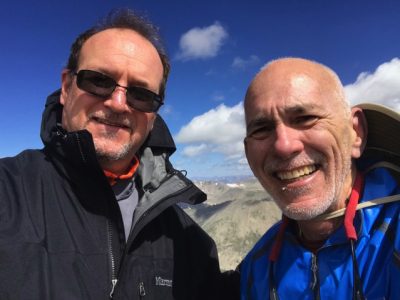
In addition to repairing cleft lips and palates, Sharing Smiles also provides physical therapy for children and dental care. Hospitals in Latin America provide the operating and recovery rooms, while charities and other non-governmental organizations provide transportation, food and accommodations for families too poor to afford them.
“Overseas, it’s not unusual for us to operate on children 4 to 15 years old,” de Armas said. “When you see an individual who has walked around with their face damaged like that and then you see it repaired, you see the dramatic change that happens.
“On a personal basis, it’s incredibly moving to have a child whose face is broken and they have it fixed and come up to their mother and watch the face of the mother when she sees that child for the first time and hardly recognizes them. That’s very, very emotional,” he said.
-For more information or to donate, visit the Sharing Smiles website.
-Cory Lancaster

